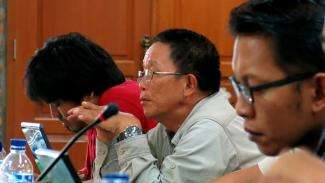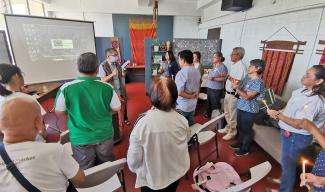A Meeting to Address the Environmental and Social Crises in Kalimantan
Posting Date
Bogor, December 16, 2013-The meeting of regional partners for Samdhana's projects in the Borneo region took place in Bogor on 16th and 17th December 2013. Following up on an initial strategic planning session in March, this meeting was used to fine-tune the Strategic Road Map and plan activities.
The Road Map intends to secure peoples' environment through several approaches such as asserting peoples' rights to manage their own areas and strengthening partners to scrutinize the spatial planning process and policy implementation.
Representatives of 14 organizations from different areas in Kalimantan attended the meeting. The organizations included: West Kalimantan (Pancur Kasih, SAMPAN, Gemawan, County Board AMAN West Kalimantan, LBBT), East Kalimantan (County Board AMAN East Kalimantan, Nurani Perempuan Foundation, Pa'tang Urip, Mine Advocacy Network /JATAM East Kalimantan) , Central Kalimantan (Mentangai Rubber Farmers Union, County Board AMAN Central Kalimantan) and South Kalimantan (Participatory mapping service node / SLPP South Kalimantan, WALHI South Kalimantan) and North Borneo (Dayak Punan Foundation).
Kasmita Widodo of the Participatory Mapping Network (JKPP) facilitated the meeting. The Kalimantan Provincial Spatial Mapping project was discussed, as well as the opportunities and challenges in the advocacy process for the Provincial Spatial Plan (RTRWP). The meeting also addressed the Kalimantan Economic Corridor (MP3EI), safeguards to REDD+, the progress of implementing Constitutional Court Decision 35 regarding forestry law, and gender and political perspectives on the government budget for the forestry sector.
Martua T Sirait, a Samdhana Fellow, delivered a presentation about a Memorandum of Understanding between twelve ministries and institutions that undertakes forest policy reform. Although questions remain regarding the future policy reform process, the UKP4 hopes to effectively coordinate the relevant ministries and institutions to address the social and environmental agendas.
"It should be clear where are the customary forests, village forests, and privately-owned forests. The claims are based not only on the map, but also from official documents,"said Martua.
Each of the participants also gave presentations to update all partners about the current status of his or her respective institution. For instance, Fajri Nailus of SAMPAN Kalbar, discussed the establishment of coastal forests and village community forests in West Kalimantan.
Ignatius Hanyang of Yayasan Nurani Perempuan reported on the status of permits for mining, plantations, and logging concessions in the area of East Kalimantan where his organization operates.
Yoseph Luhat of Pa'tang Urip from East Kalimantan questioned the application of Constitutional Court Decision 35, pointing out that the verdict is only at the stage of recognizing the problem but not does not answer the needs of society.




